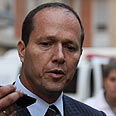
The mayor of Jerusalem is overstepping his authority and trying to effect political change, rightist lawmakers claimed after Nir Barkat called to cede municipal control over some neighborhoods in the eastern part of the capital.
Some leftists also criticized the plan, saying it would lead to anarchy.
Related articles:
- Jerusalem's Mughrabi Bridge closed
- Jerusalem mosque falls prey to arson
- 'Jerusalem bill' up for debate
- 'Jerusalem bill' up for debate
The Jerusalem Municipality explained that the measure was examined, along with other alternatives, as a way of dealing with the incompatibility between the route of the West Bank security barrier and Jerusalem's municipal borders, which makes it difficult to provide services for all the capital's residents.
"This challenge does not necessitate a change of borders," one city official stressed, "the mayor presented the plan to security officials, and he plans to show it to Prime Minister Benjamin Netanyahu as well."

West Bank security barrier (Photo: Reuters)
But coalition chairman Zeev Elkin (Likud) said Barkat's plan could jeopardize Jerusalem's unity. "The areas he wants to cede are under the State of Israel's sovereignty and are protected under Basic Law: Jerusalem, Capital of Israel and the referendum law, which was passed by the current Knesset," he said.
"Relinquishing areas outside the security barrier was a huge mistake. It only increased the city's Palestinian population and was detrimental to security, especially in the Pisgat Zeev neighborhood," the MK claimed. "Those who wish to turn some of Jerusalem's neighborhoods in the 'Gaza Strip' will end up turning all of Jerusalem into Sderot. We won't let that happen."
MK Arieh Eldad (National Union), who recently submitted a bill which aims to to cement Jerusalem's status as "united capital of the Jewish people and the State of Israel," accused Barkat of ignoring Israeli criminal law, "which states that ceding land that is under state sovereignty constitutes treachery.
"Barkat is trying to assume the role of prime minister and effect political changes instead of enforcing his authority as mayor of all Jerusalem," said the rightist lawmaker.
Attorney Elisha Peleg, a city council member on behalf of the ruling Likud party, said the mayor "does not have the authority to relinquish parts of Jerusalem."
"Statements such as Barkat's go against the coalition agreement and the government's position, which opposes the division of Jerusalem. They also embolden hostile elements," he said.
However, MK Zevulun Orlev (Habayit Hayehudi) said Barkat had assured him that the plan did not call for ceding parts of the capital and was merely a "technical arrangement."
But the proposal drew fire from leftist elements as well. "Any attempt to find a unilateral solution without cooperation from the residents and the Palestinian Authority is bound to fail," said Yosef (Pepe) Alalo, a Jerusalem City Council member from the Meretz party. "This is a political issue that will not be solved with administrative measures. Therefore, this plan may lead to anarchy and the transfer of some residents from one side of the fence to the other."
Ir Amim director Yehudit Oppenheimer called the initiative "dangerous and cruel" and said it was mainly aimed at "revoking the residency status of 70,000 Palestinian residents of Jerusalem who live beyond the fence.
"The plan's implementation would mean that they would lose their jobs, and it would deny them access to education and health services – all this just to preserve some imaginary demographic balance," she said.
Alalo said the only positive aspect of the plan was that by initiating it Barkat "admitted that the city's Arab residents are systematically discriminated against."
Omri Efraim contributed to the report
Follow Ynetnews on Facebook and Twitter
Receive Ynetnews updates directly to your desktop















